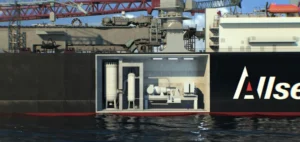TerraPower and Southern Company complete installation of the integrated effects test of the first molten chloride fast reactor (MCFR). The test is the largest salt chloride system in the world developed by the nuclear industry. The project will demonstrate how MCFR technology will perform to provide a carbon-free energy source by 2035.
Academic and industrial cooperation
TerraPower, in its Everett, Washington laboratory, is conducting integrated effects testing of the first MCFR reactor. Thus, the project continues the work initiated in 2015 by Southern Company Services and TerraPower. It is part of the U.S. Department of Energy (DOE) Advanced Reactor Concepts (ARC-15) award.
The DOE award is a multi-year effort to promote the design of Generation IV nuclear reactors. The project team consists of CORE POWER, EPRI, Idaho National Laboratory, Oak Ridge Laboratory and Vanderbilt University. The program represents a total investment of $76 million with a public-private cost sharing of 60% and 40%.
TerraPower’s MCFR is a salt-cooled fast reactor that allows for low pressure, high temperature operation. It offers superior performance, including depleted uranium, and safety and durability benefits. Finally, it allows a reduction in investments, operating and maintenance costs.
A technology of the future
The next generation of nuclear reactors promises the same stable value derived from the current operating nuclear fleet. They can also complement intermittent renewable resources on the grid. In addition, the next generation would provide carbon-free process heat and thermal storage.
The test signals a significant advancement in TerraPower’s MCFR technology demonstration roadmap. Data from the test operation will help validate the thermal-hydraulic and safety analyses required for the MCFR. The system will also support the development of the molten chloride reactor experiment at Idaho National Laboratory.
The Idaho National Laboratory is working on an approximately 200-kilowatt reactor to provide experimental and operational data. The integrated effects test and the molten chloride reactor experience will inform the design and operation of MCFR reactors. They will have a capacity of about 180MW and will be operational in the early 2030s.






















